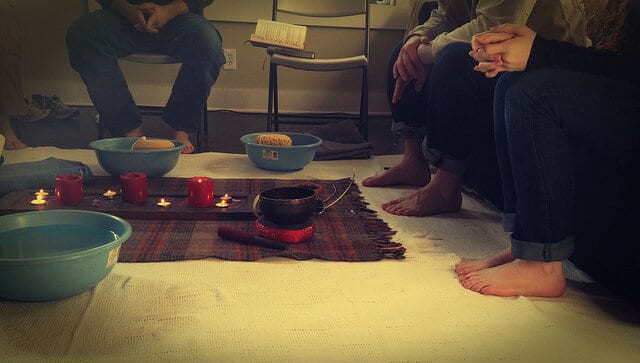Sueihn Lee moved to Kensington through The Simple Way’s Residency program over four years ago. Today she is sharing her reflection on community.
As an idealist/perfectionist, I’m vulnerable to the threat of disappointment overshadowing me with cynicism and despair. Since I started working full-time at a nearby health center 3 years ago, it’s been challenging to manage my time well. Sometimes I feel like I don’t do enough. I’m disappointed when I fall short of my ideal image of myself – an idol that I seek after instead of the person of Jesus at times.
Similarly, I had an ideal image of what intentional community should be like. But even amidst the glimpses of joy, disappointment has peppered the 4+ years of flux and change that I have lived through in this neighborhood. People have come and gone. Rhythms, structures and activities have formed and dissipated. Relationships and dynamics have reflected our brokenness. The pressure of others’ and my own expectations have weighed heavily.
In Life Together, Dietrich Bonhoeffer warns, “He who loves his dream of a community more than the Christian community itself becomes a destroyer of the latter, even though his personal intentions may be ever so honest and earnest and sacrificial. When this idol falls apart, “he becomes, first an accuser of his brethren, then an accuser of God, and finally the despairing accuser of himself.”
Not to say that we can’t be intentional about living out our values, or that we shouldn’t engage in self-critique to find ways to do things better. But I’ve learned that acceptance and surrender to God are necessary first steps toward transformation. Acceptance is not passively remaining as you are, with a shrug of the shoulders. It is a compassionate awareness that clearly beholds the sometimes ugly truth, so that you can be open to the presence of God in the midst of it. Surrendering to this presence heals us and invites us to a new way of being and living, to join in what God is already doing.
Ultimately, as David Janzen writes in the The Intentional Community Handbook, “Community pioneers do not build community; they do not even plant the seeds of community; but they are called to nurture a garden that God has planted in the unique persons and context of shared life.” When I look at how God is moving in our neighborhood in this season, I feel hopeful about the sense of stability and rootedness sustained by the committed households who have lived here for several years. We recently met together to plan neighborhood events, explore what gives us life, and to dream. I realized that just being together is such a gift. As we share life and cultivate our relationships, I believe that beautiful things will grow out of it, and already are – at their own pace, but beyond what I can imagine.
With Easter season still resounding in my heart, I’m encouraged by Janzen’s conclusion: “The good news is that communities, like people, need not complete a life cycle and die but that God is active to prune and restore so that we can be born again and again.”


0 Comments